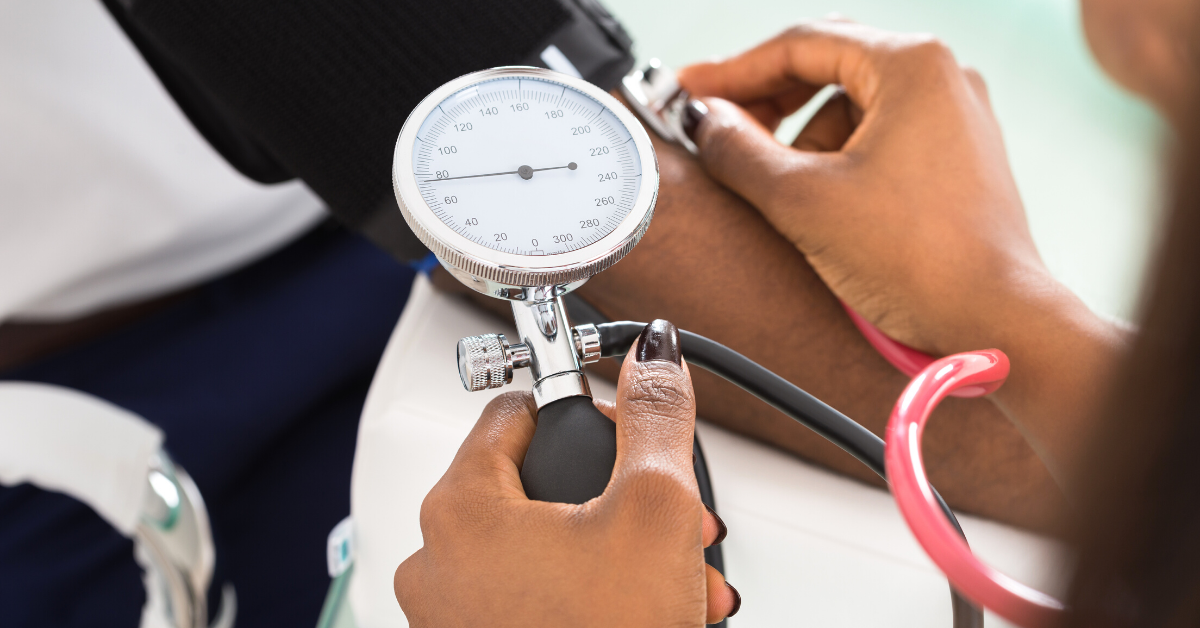
FAQ: What is hypertension and how does it relate to diabetes? Get the answers from a diabetes educator here.
Two thirds of people with diabetes report having hypertension or are taking medication to manage their blood pressure vs approximately half of those without diabetes – that is a total of 108 million people! High blood pressure can lead to stroke, cardiovascular disease and kidney failure – so it is not something to be ignored!
What is blood pressure?
It is the pressure against the walls of your arteries. When your heart pumps to send blood through your body, it creates pressure against the walls of the vessels. That is the higher number. When the heart takes a quick break between beats, it is in the “relaxation phase” and that is the lower number.
What is hypertension?
Hypertension is high blood pressure.
There is some discussion about what is the critical number for high blood pressure. But everyone agrees, the blood pressure should NOT be higher than 140/90 mm Hg. Depending on your health, your provider may want your blood pressure to be less than 130/80 mm Hg.
As people age, the walls of the arteries can become stiffer, contributing to the risk of developing high blood pressure.
Is high blood pressure harmful?
YES! High blood pressure is often called the silent killer because it can occur without any signs or symptoms.
-
It can lead to mild memory loss and contribute to dementia and stroke by decreasing blood flow to the brain and increasing the risk of blood clots
-
It can cause many problems for the heart: irregular heartbeats (arrhythmia); enlarged left heart (more pressure needed to delivery oxygen to the body) and eventually heart failure (due to the overworked heart)
-
Kidney damage can occur due to damaged blood vessels unable to filter waste products
-
There is increased risk to the retina of the eye – the light sensitive area of the eye, causing blurry vision and reduced sight
What are the signs and symptoms of high blood pressure?
There may be no signs or symptoms. But, some of the most common signs and symptoms of high blood pressure are:
-
Headache
-
Fatigue and confusion
-
Chest pain
What can we do to prevent or treat high blood pressure (also known as hypertension)?
Eat healthfully (we hear that a lot!) That means eating a variety of fruits and vegetables every day. Think about a fruit or vegetable with every meal. You can also sneak them in for snacks when you are hungry between meals. Include whole grains and low fat dairy products in your food plan.
Maintain a healthy weight range by eating healthfully, watching portion sizes and being active every day.
Reduce dietary sodium - For about 30% of people with high blood pressure, reducing the amount of salt in the diet may also be helpful. So less processed foods (pickles, sauces, boxed dinners) and removing the salt shaker from the table. Instead use spices and pepper to add flavor.
Drink alcohol in moderation – no more than 1 alcoholic beverage for women and no more than 2 for men (there are some clinicians who think this should also be no more than 1 for men).
Exercise regularly (we hear that a lot, too!). That could be taking a walk with your dog, a ride on your bike, some laps in the pool at the local fitness center, or being more adventurous with soccer, basketball or a hockey game (you are playing NOT just watching).
Do not smoke – if you do – QUIT!
Reduce stress – this may be the hardest challenge of all. Relaxation exercises, getting adequate sleep, even changing jobs may be ways to reduce your stress.
Take your blood pressure medication faithfully – that is every day! There are a variety of blood pressure medications that can help you maintain a healthy target. Common examples are:
-
beta blockers which help your heart to beat more slowly and with less force
-
ACE inhibitors [angiotensin-converting enzyme] and ARBS [angiotensin receptor blockers] both of which help to relax your veins and arteries to lower your blood pressure.
You and your provider can determine which one is right for you.
Have your blood pressure measured at every office visit
You may be able to blame high blood pressure on your parents and grandparents (it can be hereditary) but the most important thing is managing it. Talk with your health care provider if you have concerns about your blood pressure. You can check it at home with an inexpensive monitor. It will vary during the time of day and after activity – but if it trends higher than your recommended level – make sure you follow the suggestions listed above to keep a healthy number and talk with your health care provider!
Learn more about hypertension from the American Heart Association's Watch, Learn and Live.

